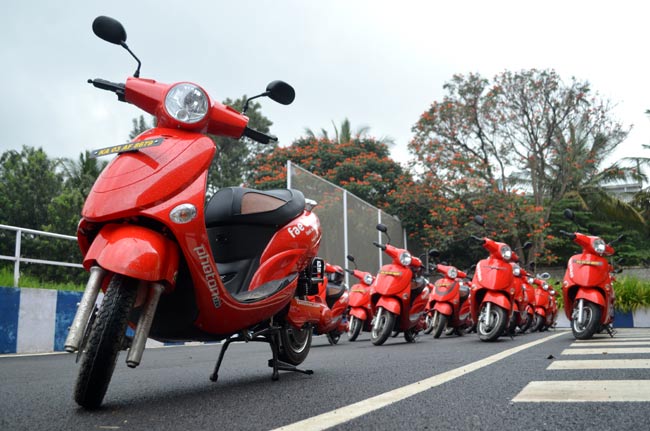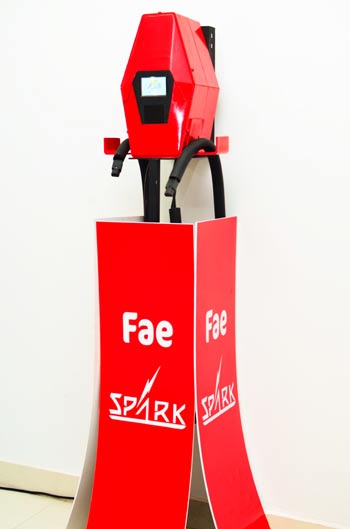
“The future of mobility is going to be shared and electric” says Sameer who is the Co-Founder and CTO of FAEbikes, a company which provides EV ride hailing services. All their EV’s are spread across the city of Bangalore connected to internet through IoT allowing them to remotely monitor their bikes. The users who wish to avail their services can simply download their mobile application, book their ride and unlock the bike remotely via the app to start using it. These bikes can easily reach 55kmph speed with a range of 70Km providing an economical ride through the city. Recently in 2018 the company also started working on charging stations and has announced to set-up India’s biggest network of charging station in Bangalore. Inspired by its works and plans, CircuitDigest approached Sameer with few questions and his response is as follows…..
Q. What inspired you to start Faebikes?
When me and Yugraj moved to Bangalore for our work, we realized the need for a better transport solution. I used to travel from RT Nagar to Koramangala for office and had to change three buses. The commute used to take more than 1.5 hours. We realized that there is a huge gap between the cheap buses and autos and taxis which are very expensive. So we came up with FAE Bikes which was very close to the pricing of buses and more than 3 times cheaper than autos and taxis. At the same time, it provided the independence and convenience of a personal vehicle which no other transport solution provided.
We started with a vision to provide clean, shared and sustainable mobility for the masses. But during the course of our journey, we became a part of the bigger EV ecosystem. We realized that mass EV adoption cannot happen without setting up the infrastructure. And hence, in October 2018, we launched FAE Spark, a network of EV Charging Stations. Today, setting up charging stations is not sustainable, but we have come up with a business model for FAE Spark which leverages our unique position and allows us to be sustainable from the beginning.
Q. How do you see EVs for ride hailing services?
As more and more of India is migrating to cities, sustainable solutions are needed in every domain to survive with our limited resources. We believe the future of mobility is going to be shared and electric. Personal Vehicles sit idle for 95% of the time. A shared mobility solution will help in better utilization of available resources, reduce congestion and EVs are going to be the drivers of this. EVs are necessary in reducing the operational costs to get better and sustainable unit economics.
Q. How does Faebike leverage IoT to automate its electric scooter share service?
From the start, we have been a technology-focused company. We are continuously working on improving our service and making it more accessible to user with the help of technology. We are installing IoT solution in all our scooters which make our scooters smart and keyless. Our users can lock and unlock the scooters using the app. They can also lock and unlock the storage space using our IoT solution to access the helmet. Along with this, an array of features like remote engine immobilization, geo-fencing, tow detection, crash detection etc help us effectively run the service. This allows us to deploy our vehicles on a pick-anywhere-drop-anywhere model which is necessary for a true micro-mobility solution.

We have developed the IoT solution in-house and it has helped us save more than 75% cost per unit. We are manufacturing it in Karnataka and sourcing the components from across India.
Q. How do you see the ecosystem for EV in India? How would Faebikes add up to it?
EV ecosystem in India is growing fast but it’s still in a very nascent stage. However, there is a lot of resistance to EV acceptance in India. The two biggest challenges the EV ecosystem is facing today are – lack of awareness and lack of infrastructure. Few years back, due to government subsidies, a lot of Low-speed, Low-power Electric scooters with Lead-Acid batteries were sold. This gave everyone the wrong impression about electric scooters. The general public is of the opinion that electric scooters are going to be sluggish and lack acceleration. They can’t drive if two people are sitting and won’t be able to go on a flyover.
However, this is far from reality about today’s scooters. The vehicles above today can beat even Activa in the initial acceleration. They can take lead at signals and also have decent top speeds. These scooters have enough power for a zippy ride even on flyovers carrying two riders. Along with this, the ride is very quiet and smooth. There are no vibrations like an IC vehicle. It is the responsibility of the whole EV ecosystem, especially OEMs, to spread this awareness to the public so that more and more people start choosing EVs over IC vehicles.
During the course of building Fae Bikes, we have become entrenched in the ecosystem. We are tackling both the problems from the front lines. We are creating awareness about the vehicles by bringing them directly to the public. At the same time, we are also focused on creating the charging infrastructure so that people can purchase EVs without range anxiety.
Q. Faebikes is in the process of setting up India’s biggest network of charging stations, tell us about it. At what stage is it currently at?
Yes, we are proud to say that we are setting up India’s biggest network of charging stations. We aim to install atleast 1000 charging stations this year. We have developed the charging station in-house after a lot of R&D effort. We have ensured that the charging stations are equipped with a lot of safety features. However, the journey for setting up these charging stations has just started. We have currently installed 10 charging stations for a start. We are in the process of streamlining our manufacturing. Also, We have recently finalized our partnership with 200 petrol bunks across Bangalore and we will soon begin the process of installation in the petrol bunks. Our charging stations will also be compatible with all available EVs.
Q. While a conventional Lithium scooter takes anywhere between 4-6 hours to charge, the FAE Spark chargers claims to charge the vehicle in less than 2 hours, how is this achieved?

A lot of effort has gone towards developing fast charging for 4-wheelers around the world. Consequently, a lot of standards already exist for fast charging cars like CHAdeMO etc. However, similar efforts are lacking for smaller vehicles like scooters. We wanted to make fast charging solutions for scooters as India is a two-wheeler majority country. We launched our proprietary fast charging solution in October 2018, with which we are able to charge 1% per minute. I can’t reveal technical details at this stage on how this was achieved. However, I would like to share an exciting development happening in our labs. We have prototyped a solution which will give a boost of 8-11 kilometers to a scooter with a charge of less than 1 minute. I believe this will revolutionize how we view public charging and range anxiety.
Q. What are the technological hurdles in implementing charging stations for India?
The biggest hurdle currently is lack of a charging standard. This is necessary to bring down the CAPEX of setting up charging stations. I feel that it is the ideal time for the Government to create standards before the market grows further. As more and more manufacturers enter the fray, it will become difficult to enforce a single standard.
Q. Is battery swapping an ideal way to increase the range of EVs? What are the pros and cons of it?
Battery Swapping is an excellent way to increase the range of EVs. It has seen a lot of success around the world. Take the example of Gogoro which has set up swapping stations in Taiwan, Paris etc. A few companies in India are also trying to set up battery swapping station with Sun mobility being the biggest name. However, battery swapping comes with its own set of challenges and benefits. I will start with the benefits. Only battery swapping can replicate the time it takes up to fill petrol. The battery is under completely controlled environment and can be charged slowly which increases battery life. If proper diagnostics and Battery life management are implemented, the batteries can be used beyond their normal life i.e. even at lesser capacities like 75%.
However, the capital expense associated with battery swapping is too high. Also, battery technology Is certain to evolve quickly and all the batteries taken by the swapping station owner will become obsolete quickly. Also standardization of battery across vehicles is necessary if a non-OEM wants to scale the battery swapping stations.
Q. What are your thoughts on Lithium Cell manufactures in India? Why do most EVs manufacturers still source batteries form china?
Lithium cell manufacturing in India is non-existent. Today, All battery OEMs are importing Lithium cells from China to develop battery packs. The reason for this is that India simply doesn’t have the technology and manufacturing ability to manufacture lithium cells. India is one of the largest importers of lithium-ion cells and batteries. It is also true that many times, these battery packs are better than the Chinese battery packs.
However, concrete steps have already been taken by few agencies and even government has signed MoUs for setting up manufacturing of Lithium-ion Cells. As India is lacking in critical resources to make the cells including lithium, I think recycling these materials from discarded batteries is going to be the future.
Q. What are the future plans for Faebikes?
We aim to become the India’s largest e-fleet aggregator and network of charging stations. We aim to be in the forefront of EV revolution in India by building cutting edge tech innovations for India. We stand successful in creating a sustainable business model by leveraging EV sharing and infrastructure that enables accelerate EV transformation. We look forward to scale this model across the world and spearhead the transformation.

